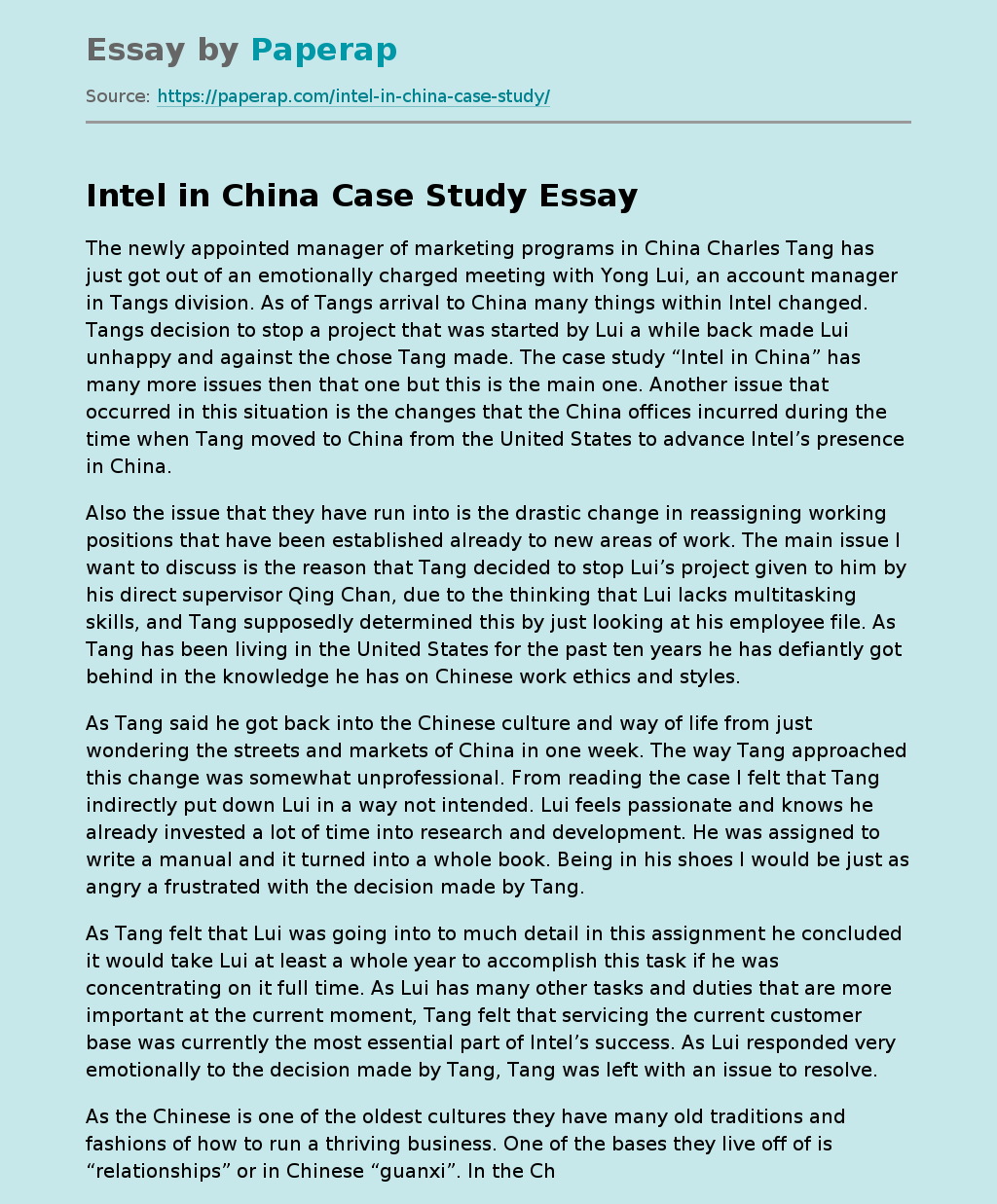The newly appointed manager of marketing programs in China Charles Tang has just got out of an emotionally charged meeting with Yong Lui, an account manager in Tangs division. As of Tangs arrival to China many things within Intel changed. Tangs decision to stop a project that was started by Lui a while back made Lui unhappy and against the chose Tang made. The case study “Intel in China” has many more issues then that one but this is the main one.
Another issue that occurred in this situation is the changes that the China offices incurred during the time when Tang moved to China from the United States to advance Intel’s presence in China.
Also the issue that they have run into is the drastic change in reassigning working positions that have been established already to new areas of work. The main issue I want to discuss is the reason that Tang decided to stop Lui’s project given to him by his direct supervisor Qing Chan, due to the thinking that Lui lacks multitasking skills, and Tang supposedly determined this by just looking at his employee file.
As Tang has been living in the United States for the past ten years he has defiantly got behind in the knowledge he has on Chinese work ethics and styles.
As Tang said he got back into the Chinese culture and way of life from just wondering the streets and markets of China in one week. The way Tang approached this change was somewhat unprofessional.
From reading the case I felt that Tang indirectly put down Lui in a way not intended. Lui feels passionate and knows he already invested a lot of time into research and development. He was assigned to write a manual and it turned into a whole book. Being in his shoes I would be just as angry a frustrated with the decision made by Tang.
As Tang felt that Lui was going into to much detail in this assignment he concluded it would take Lui at least a whole year to accomplish this task if he was concentrating on it full time. As Lui has many other tasks and duties that are more important at the current moment, Tang felt that servicing the current customer base was currently the most essential part of Intel’s success. As Lui responded very emotionally to the decision made by Tang, Tang was left with an issue to resolve.
As the Chinese is one of the oldest cultures they have many old traditions and fashions of how to run a thriving business. One of the bases they live off of is “relationships” or in Chinese “guanxi”. In the Chinese culture gaining a relationship and keeping it is worth more then any and dollar value. It is a keystone factor in keeping any business relationship in China. As Tang has been in the United States for a significant period of time I feel he has adjusted too much to our laid back and forgiving work ethic.
As of this he has ruined his first relationship with a valuable co-worker and friend. As Tang might have cared about the welfare of his workers he really hurt some people with his unintentional actions. Tang must decide on how to resolve this issue with Lui and make sure to keep good relations with everyone in the division. He has a few options available to him to resolve the issue. One is to let Lui complete the project but speed up the process. Second is finishing the project on terms that a compromise between Tang and Lui can be achieved.
Lastly, give Lui a new project that will relate more to what Tang wants to do to improve Intel’s success. In my opinion Tang initially was trying to fix something that was not broken. This is not the correct way of facilitating people with skills and talents that the company value highly. I recommend to Tang that he listens more to the people then telling them what to do and how to do it. As Tang is the new guy there, he is not the worker who has been at Intel China for many years.
I recommend that Tang lets Lui finish what he started no matter how long it will take because it is key for Tang to save his relationship with Lui at this stage of the company’s success. In conclusion, I learned an abundant amount of information from the mistakes made by Tang. As a leader and a supervisor he approached his international team in a way typical in the United States but not China. I currently experience the same problems that Tang does as I am a native Russian but have live in the United States for 14 years.
I work for an international trading company that concentrates on the market of Russia. The travel to Russia twice a year for me is an eye opener to a totally different work ethic then I am used to. As I inspect our Russian operations in Russia I try to keep my comments and suggestions to myself. The reason is because the managers on that coast have a totally different work ethic and style. As this course has thought me how to be a more effective leader and decision maker I feel this case was a perfect final assignment for me.
Intel in China Case Study. (2019, Dec 05). Retrieved from https://paperap.com/intel-in-china-case-study/

